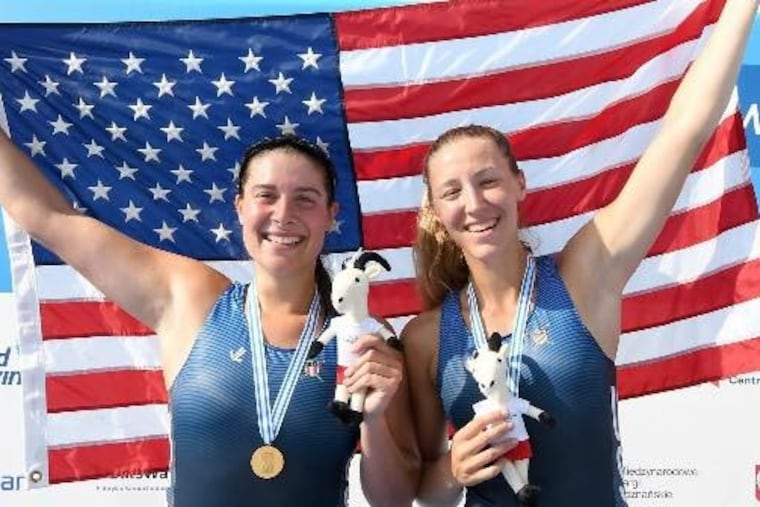Former Penn rower Regina Salmons is using her experience to fuel her Olympic ambitions
She is training with the U.S. women’s rowing team in pursuit of a spot on the squad at the 2020 Tokyo Olympic Games.

Former Penn rower Regina Salmons lives by this motto: You can’t let a bad day define you.
“The bad days have to make you even better,” Salmons said.
There have been few bad days for the 21-year-old Salmons recently. After graduating from Penn in May, Salmons is living these days in Princeton, N.J., with a host family as she trains with the U.S. women’s rowing team in pursuit of a spot on the squad at the 2020 Tokyo Olympic Games.
There are 34 rowers competing for 18 seats.
“The experience has been very tough and very competitive, but the more senior girls are very supportive and are great role models,” Salmons said.
Salmons, from Methuen, Mass., attended the Derryfield School in New Hampshire, and that’s where she began her rowing career. Training in a single beside the boys’ four, she still recalls her breakthrough moment in the sport, when the coxswain in the four yelled to his rowers, “Are you going to let a girl beat you?”
From that moment, Salmons let her anger at that comment propel her to become the athlete she is.
“It changed me and constantly drives me to this day,” she said.
In July, Salmons became the under-23 women’s pair world champion after winning the World Rowing Championship race with Alina Hagstrom in Poland. She also won gold in the four and eight boats at the 2016 World Rowing under-23 championships. Salmons graduated from Penn as the co-captain of the Quakers women’s rowing team.
Salmons attributes much of her recent success to the Penn rowing program and women’s coach Wesley Ng.
“Wes was very technically focused. So when I went to the selection camp for the under-23 national team, I had an upper edge. I was so prepared,” Salmons said.
She also said it was Ng who approached her about trying out for the under-23 team in her sophomore season at Penn.
“I didn’t know what under-23 was before Wes told me about it,” Salmons said. “He said I had the right build, and if I could drop my [training] scores I would be a great fit.”
Ng, who has coached in the U.S national program, said Salmons has benefitted from focusing on the fundamentals of training.
“She sees the physical side of what she does as an expression of her whole self and is very comfortable in her own skin,” he said.
Ng said the difference between Olympic and collegiate rowing is huge, so the transition is challenging.
“You need humility in the process,” Ng said. “But with her past of competing against some of the best teams while at Penn, she has that.”
Salmons also had to adapt to a different training schedule. The fall and spring in college rowing is for racing, and the winter is for indoor training. Elite level rowers train year round.
“It took a change of mindset for me. You need your body ready all the time,” Salmons said. “We get no days off. We have practice every day at 7 a.m. for about two hours, have a four-hour break, have a second morning practice, and then have an afternoon practice that we can do on our own.”
And the competition is intense.
“It is important to act with urgency to be your best every day,” Ng said. “There are so few spots available, so it is crucial to be ready at the right times and to constantly stay healthy.”
Another important factor for elite rowers is overcoming disappointment.
“In my freshman year at Penn, we came in seventh at the Ivy League Championships, and in my senior year we placed third,” Salmons said. “I knew what losing felt like, and it drove me to do better.”
“It’s about having a short memory,” Ng said.
Penn has a history of Olympic rowers and coaches. Susan Francia won two golds in the 2008 and 2012 Olympics after walking on to the Penn women’s team in 2001.
Sarah E. Garner won a bronze medal in the 2000 Games in Sydney, and Barbara Ann Kirch Grudt was both a national team coach for several years and an Olympian who finished sixth in her race at the 1988 Games in Seoul.
For Salmons, boat selections will be made in June for the World Rowing Championships and shortly after that for the Olympic.
“I’m the new kid on the block,” Salmons said. “But that won’t stop me from achieving the Olympic dream.”